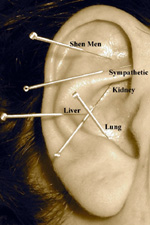 The National Acupuncture Detoxification Association’s auricular acupuncture protocol, commonly called the NADA protocol, is commonly used for treating various addictions ranging from smoking cessation, to substance abuse and withdrawal. It is an auricular acupuncture protocol that has a set number of points that are needled in both ears. The actions of these points help people recover from substance abuse by helping in the detoxification process and helping with emotional, physical and psychological factors associated with the addiction. Research has looked at the NADA protocol in smoking cessation, cocaine addiction, psychoactive drug withdrawal, and alcohol dependence in recent years. Despite how popular the NADA protocol has become in addictions treatment, quality research is still lacking. Consequently, when one looks at all the research, it appears to be inconclusive on the efficacy of this treatment. However, when you look at the research studies that have been done closely, there are serious shortcomings since the studies lack consistency in their methodology. Some have measured effectiveness of the NADA protocol by measuring if the patient turns to the substance of their choice. Other studies have compared effectiveness of the NADA protocol by comparing it against sham acupuncture or no intervention. However, none of the studies have combined auricular acupuncture with other interventions when it comes to treating the addiction. The NADA protocol when combined with other treatments such as botanical tinctures for smoking cessation or substance withdrawal increases the patient’s ability to cope with the emotional and physical demands as their body detoxifies. In order to effectively quit smoking or alcohol dependence, old habits need to be broken and replaced with new healthy habits and coping mechanisms. The ultimate test comes down to when a stressful situation arises and how one is able to cope without turning to the substance of their previous dependency. The auricular acupuncture helps to provide the additional support needed to this effectively. The main five points in the NADA protocol are:
1 Comment
When are you too old to benefit from quitting smoking??? NEVER!!!
A recent systemic review published in the Archives of Internal Medicine looked at cohort studies conducted in the United States, China, Australia, Japan, England, France and Spain in adults 60 years of age and older. Research prior to this focused on the effects of smoking cessation in middle aged adults. To no surprise, quitting smoking at even older ages reduces the risk for death especially as more time passes since quitting smoking. These findings are very relevant as we are living longer than ever before. In other words, current smokers had a 83% increased mortality risk but former smokers had a 34% increased mortality risk compared to individuals who have never smoked. We all know that one should not smoke now. However, it is not as easy as that. Society at one time encouraged smoking as it was the norm. Companies bombarded individuals with advertising from an early age to get them to smoke. Others have grown up exposed in homes with smokers. Now there is research to support smoking cessation in older patients. These are the same individuals that believe they are too old to quit or more importantly too old to benefit from quitting. Smoking is a strong risk factor for premature death and cohort studies such as this further emphasis the benefits of quitting smoking. The more time that has elapsed since quitting smoking, the lower the mortality rate becomes even in older former smokers. With older individuals instead of focusing on educating about the risks of smoking, the focus needs to be on providing them with the tools to effectively quit smoking. Most people already know the risks but, they lack the practical tools to effectively quit. Quitting smoking is a multi level decision since it involves physical, mental and emotional aspects. In order to be effective, one's body needs to physically quit smoking while establishing healthy coping mechanisms to handle stress especially when placed in tempting situations. Breaking old habits is difficult but it starts with the first step of deciding to do so. |
Harmi KalerDoctor of Naturopathic Medicine in Okotoks and Calgary. Categories
All
Archives
July 2015
|
CLINIC INFORMATION
|
LOCATION
113 - 109 Southbank Blvd
Okotoks AB T1S 0G1 Phone: 403 938 1138 Fax: 403 982 2114 Email: [email protected] |
HOURS
Monday: 10am - 6 pm Tuesday: 10 am - 6 pm Wednesday: 10am - 6 pm Thursday: 10am - 6 pm Friday: 10am - 6 pm Saturday: by appointment only Sunday: Closed Holidays: Closed UPCOMING CLINIC CLOSURES
|
This website is for educational purposes only. The content on this website is not meant to treat, diagnose or prevent any conditions. Always consult with a qualified healthcare provider for your care. The author of this website is not liable for any adverse effects that may occur based on any information obtained from this website.
Copyright ©2013-2023 by Harmony Health Integrative Centre. All Rights Reserved
Copyright ©2013-2023 by Harmony Health Integrative Centre. All Rights Reserved


 RSS Feed
RSS Feed